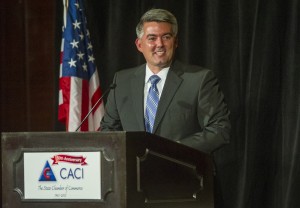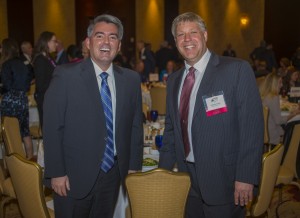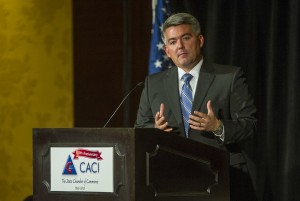In this Capitol Report:
This Capitol Report is brought to you by:
State Policy News
U.S. Senator Cory Gardner Covers the Waterfront of Business Issues for CACI Members
About 300 CACI members and guests gathered yesterday for the 50th Annual Meeting, which was held at the Ritz-Carlton Denver as Colorado’s junior Senator delivered his first-ever remarks to a CACI luncheon audience.
U.S. Senator Cory Gardner (R), elected in November 2014, covered a wide range of topics of interest to CACI members, ranging from governmental regulation and the operation of Congress to the need to export U.S. oil again and improving economic opportunity for rural areas of the state.
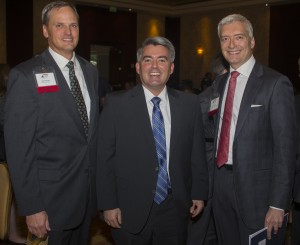
Keith Pearson, McLane Western, U.S. Senator Cory Gardner, Travis Webb, BKD CPAs & Advisors, Photo by Evan Semón
First, Senator Gardner congratulated CACI on its 50th Anniversary, and he congratulated Travis Webb, Managing Partner, BKD CPAs & Advisors, LLP, on being elected the 2015-2016 CACI Board Chair. He also said he appreciated the work that CACI does to make “Colorado’s economic environment better.”
Senator Gardner was introduced by Keith Pearson, President, McLane Western, which was the Platinum Sponsor of the Luncheon.
Senator Gardner then addressed the economic performance of the state, noting that rural areas have not kept up with the Front Range when it comes to economic recovery and job creation. He said elected state and Federal officials should work to “make sure that parts (of the state) are not left behind.”
For example, Greeley has achieved a population of over 100,000 because of the oil-and-gas industry boom while Mesa County on the Western Slope has lost 10,000 jobs.
Turning to the new Veterans Administration Hospital being constructed in Aurora that has been best by huge cost overruns and delays, the Senator said that the Colorado Congressional Delegation has worked on a cooperative bi-partisan basis to ensure that Congress provides the needed funding. Congress has authorized and appropriated $625 million to complete the VA Hospital, he said. He said the Colorado Congressional Delegation “works better than in any other state.” Senator Gardner gave credit to U.S. Senator Michael Bennet (D), U.S. Representatives Ed Perlmutter (D) and Mike Coffman (R) for the joint effort to secure funding for the VA Hospital.
Next, Senator Gardner discussed the long-term highway transportation plan that the Senate has passed and sent to the House. He said it
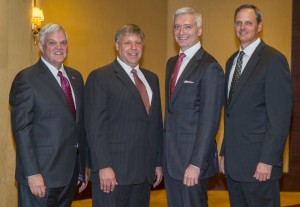
Chuck Berry, CACI, Leland Lorentzen, Golden Aluminum, Travis Webb, BKD CPAs & Advisors, Keith Pearson, McLane Western, Photo by Evan Semón
includes funds for the expansion of C-470, the re-construction of the I-70 Viaduct and the expansion of I-25 in northern Colorado.
The Senator said that he has been holding a dozen roundtables across the state to hear from business leaders and citizens. He said that one major theme that has emerged is the harmful effect of governmental regulations on the formation and operation of small businesses, in particular. Large corporations can probably adapt to regulations and pass the added cost on to customers, he said, but small businesses are harmed.
For example, Federal attempts to regulate oil-and-gas operations that are already governed by state regulation will prohibit production, the Senator said.
Senator Gardner said Congress should copy the Colorado legislature’s annual rule-review bill, which then faces an up-or-down vote in the legislature. The bill contains rules adopted by the state in the prior year, he explained.
Thus, Congress should use its budget and appropriation process in a similar manner to rein in “job-killing regulations,” he said.
On the issue of the Federal budget, Senator Gardner said the Congress should adopt a two-year budget, which it should pass, instead of relying on “Continuing Resolutions” (CRs) to keep the Government operating because Congress cannot pass a budget. The inability of Congress to pass a budget provides “great uncertainty” to the nation’s business community.
This year, the Senate is starting to work in a bi-partisan fashion, the Senator said, and in one day it passed more amendments than it passed in all of 2014. The Senate process has been “opened up” and more “inclusive bipartisan work” is being accomplished, he said.
In the area primary and secondary education, the Senator said work is being done in Congress on increasing the supply of skilled workers, especially with an emphasis on science, technology, engineering and mathematics (STEM).
Policymakers need to “rethink funding for higher education” to make it more affordable for students and parents, he said. One idea might be tax-free education savings accounts, he said.
The Senator discussed water supply needs in the future, noting that $12 billion to $15 billion is need for increasing the supply of water
to meet the state’s projected future population growth. In the context of the need to streamline the state and Federal permitting process for new water supply projects, he also discussed the Northern Integrated Water Supply Project.
If the supply of water is not increased, Senator Gardner said, then the future alternative is “buy up and dry out” farms and ranches as their owners sell water to urban areas.
Next, Senator Gardner discussed the importance of Colorado’s aerospace and information-technology sectors to the state’s economy. He emphasized that broadband needs to spread to rural areas to provide them with economic opportunity.
International trade is very important to Colorado, the Senator noted. He said 700,000 jobs in the state are tied to trade. He supports the Trade Promotion Authority (TPA), which has been strongly opposed by both Republicans and Democrats. Some people want to reject free trade and turn inwards, he said.
Free trade under the proposed Trans-Pacific Partnership will provide American exporters with access to 50 percent of the world’s gross domestic product and 50 percent of the world’s population, the Senator said.
If the U.S. withdraws from global trade, Senator Gardner said, then China “will step up” and that will harm the economic prowess of the U.S.
The Senator concluded his remarks and then took several questions from the audience, touching on such issues as the marijuana industry’s inability to use the financial system, funding for the expansion of I-25 in northern Colorado and new regulations from the National Labor Relations Board.
The final comment from the Senator concerned allowing the U.S. to once again export oil abroad. He said he favors this, along with the extension of wind-energy tax credits.
Federal Policy News
Congress and Regulations In Brief:
- On Friday, the Sixth Circuit Court of Appeals blocked the EPA’s Waters of the U.S. (WoTUS) from being implemented. Previously, only the 13 states filing suit against the water rules had been granted a stay from implementation. Colorado was one of the 13 filing states.
- Court Blocks Water Rule Nationwide, The Hill
- The House voted 261- 159 to lift the U.S. ban on crude oil exports, put in place by Congress in the 1970’s during the Arab oil embargo. CACI hosted an event this August to support dialogue among the business community about the benefits and challenges of lifting the 40-year ban.
- House Votes to Lift Oil Export Ban, The Wall Street Journal


